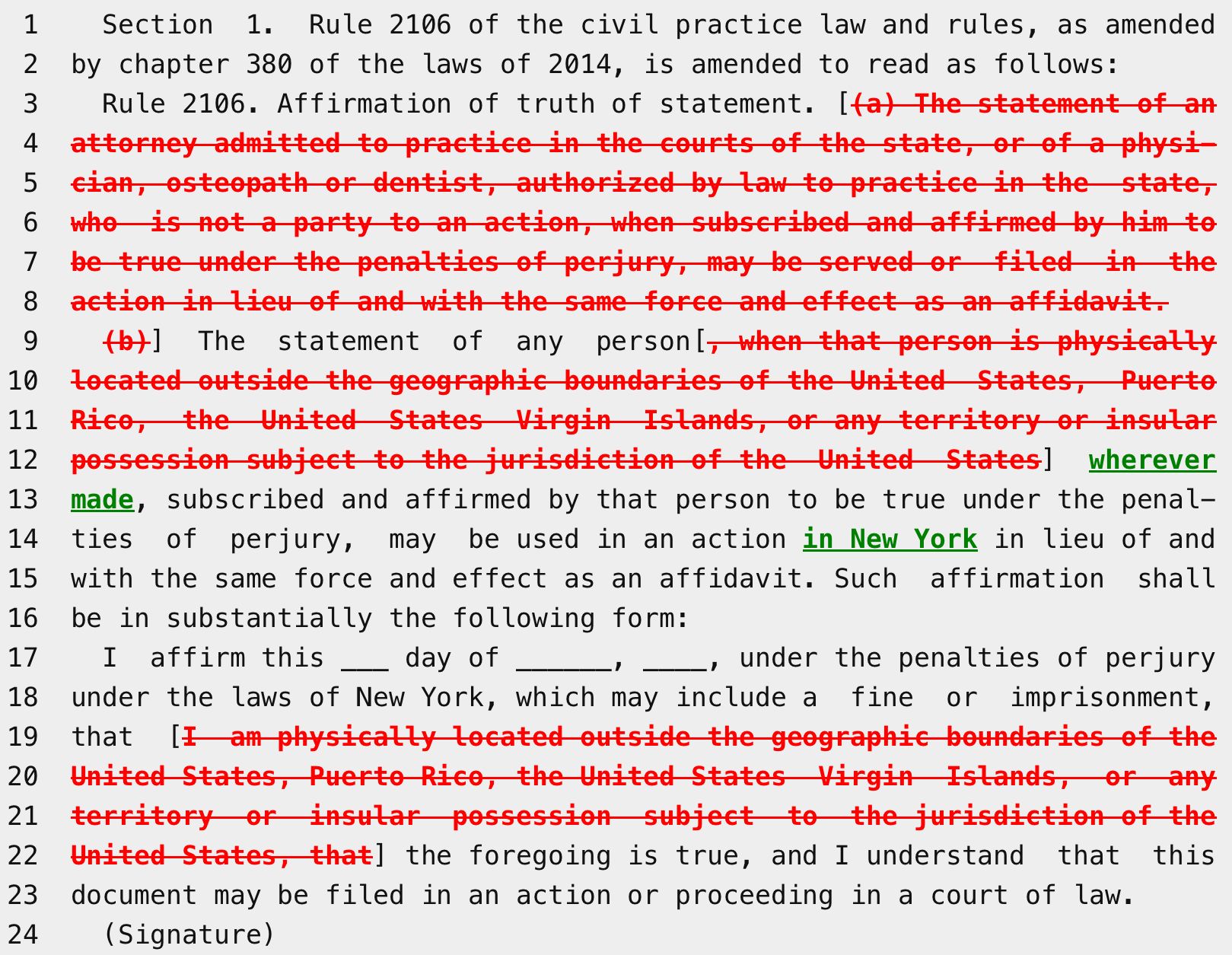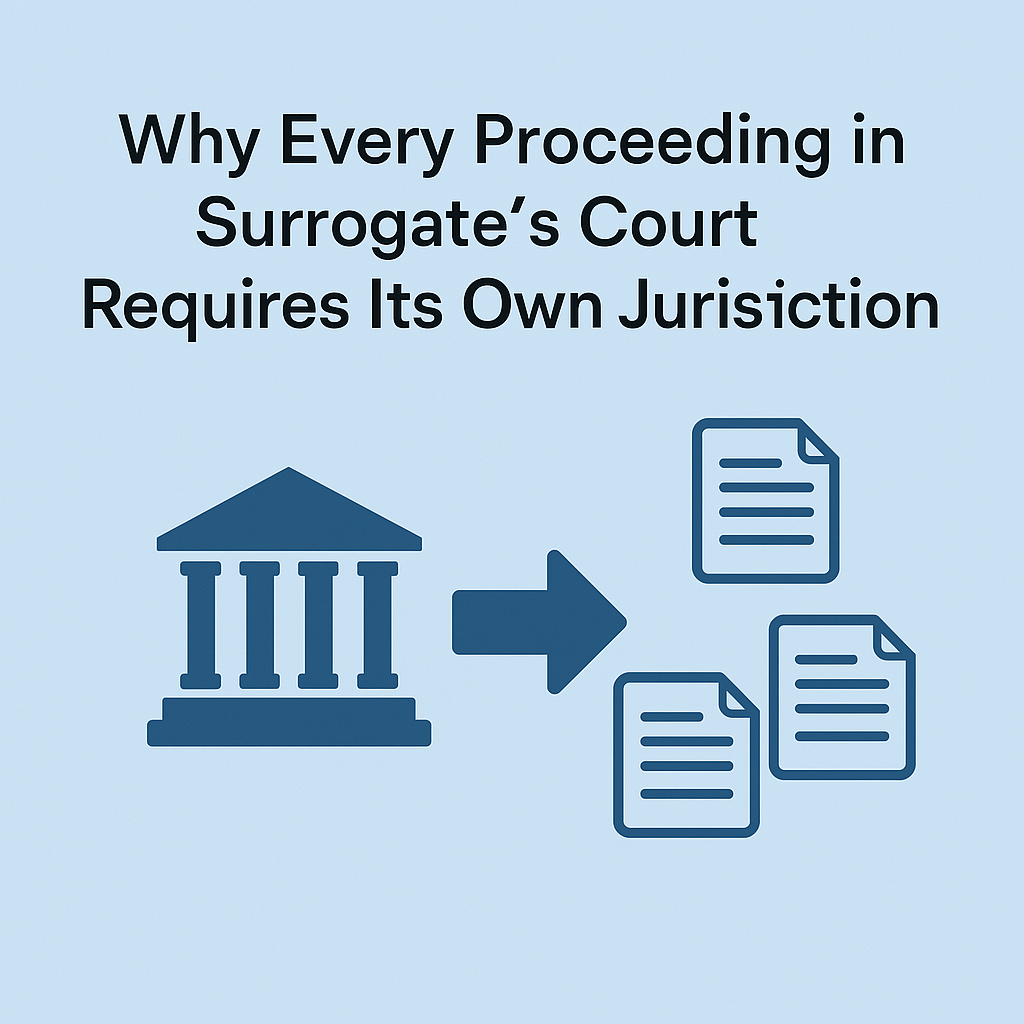On October 25, 2023, Gov. Kathy Hochul signed two laws that expand who can make an affirmation in New York. It is possible to reconcile these changes, but not their rationales.
On October 25, 2023, Gov. Kathy Hochul signed A06065 / S02997 into law, amending CPLR Rule 2106 to allow affirmations in civil actions to be made by all licensed health care professionals, not just physicians, osteopaths, or dentists. This change is effective immediately. See New York Allows Health Care Professionals to Make Affirmations in Civil Actions, Starting 10/25/2023.
On October 25, 2023, Gov. Hochul also signed A05772 & S05162 into law, amending CPLR Rule 2106 to allow affirmations to be used by any person in a civil action, effective January 1, 2024. See New York Removes Restrictions on Making Affirmations in Civil Actions, Starting 1/1/2024.
Gov. Hochul signed both laws on the same day and both laws amend the same statute, CPLR Rule 2106.
A06065 / S02997 amends CPLR Rule 2106 this way:

A05772 & S05162 amends CPLR Rule 2106 this way:

The updated version of CPRL Rule 2106 on nysenate.gov shows the final version of the statute that results from each bill and states, "NB Separately amended; cannot be put together."
Here is an annotated printout of CPLR Rule 2106 on nysenate.gov from October 28, 2023:
Although both bills change CPLR Rule 2106, they can be reconciled:
- A06065 / S02997: From 10/25/2023 until 12/31/2023, all licensed "health care practitioners" and not just a "physician, osteopath or dentist" can make an affirmation.
- A05772 / S05162: Starting 1/1/2024, everyone can make an affirmation.
But what "cannot be put together" are the justifications for the changes.
A06065 / S02997 has this justification (emphasis added):
CPLR 2106 was intended to ease the burdens of attorneys who, as a prerequisite to the submission of their own sworn written statement in an action, were required under prior law to find a notary public to administer an oath. The drafters of the CPLR determined that the attorney's professional obligations and the possibility of prosecution for making a false statement provided sufficient safeguards to dispense with the need for an appearance by the attorney before a notary public. Thus, the attorney is authorized by CPLR 2106 to simply sign his or her own statement and affirm its truth subject to the penalties of perjury. Such affirmation has the same effect as an affidavit sworn to before a notary public.
Similar considerations of convenience led to an amendment of the statute in 1973 to extend the same right of affirmation to physicians, osteopaths and dentists, whose affidavits are also frequently required in civil litigation. It is appropriate that this right be extended to other licensed health care practitioners.
A05772 / S05162 has this justification:
The requirement that litigants and other court participants have documents notarized is unduly burdensome, and federal law removed such requirements for federal courts decades ago. Attorneys, physicians, osteopaths and dentists, as well as any person outside the jurisdiction of the United States, are already exempt from the New York requirement to submit affidavits and may submit affirmations instead.
This bill will align New York with the over 20 states that follow federal practice. It will relieve unnecessary burdens on litigants, non-party witnesses, county clerks, and courts.
These two rationales are irreconcilable for two reasons: (1) Only one sees a need for "professional obligations" as a "safeguard." (2) Only one sees affirmations as an exception to the requirement to submit affidavits.
- (1) Safeguards? A06065 / S02997 identifies two safeguards that permit affirmations to be used in lieu of affidavits: (1) "professional obligations" and (2) "the possibility of prosecution for making a false statement."[1] A05772 / S05162 retains only the second "safeguard." The authors of one bill think we need both safeguards; the authors of the other think only one safeguard is enough.
- (2) An Exception? A06065 / S02997 sees affirmations as an exception to the requirement to submit affidavits and retains the traditional rationale that only some professionals can make an affirmation. In contrast, A05772 / S05162 thinks that everyone should be able to make affirmations because finding a notary for an affidavit is too burdensome.
Despite being able to reconcile the two rules, it is quite strange for lawmakers to enact a temporary expansion for healthcare professionals that will last only a few months before affirmations are no longer the exception but the norm.
In conclusion, although we can reconcile the changes New York's lawmakers made to who can make an affirmation, we cannot reconcile the rationales for the changes.
I would love to learn your thoughts about these changes. Do you think New Yorkers will continue to make affidavits after January 1, 2024?
Any person physically outside the United States can also make affirmations, but the rationale for this exception is different: "[T]here may be no clear analog of the notary, or [t]here are religious, social or bureaucratic impediments to obtaining a sworn statement for extraterritorial use." Thomas F. Gleason, Affirmations and Declarations in New York Practice, NYLJ, Sept. 26, 2014. "This amendment will for the most part end collateral litigation over whether an affidavit signed outside the United States was properly executed and greatly simplify litigation involving foreign witnesses." CPLR No Longer Requires Affidavits from Foreign Witnesses, Schlam Stone & Dolan LLP, Jan. 7, 2015. ↩︎
Hani Sarji
New York lawyer who cares about people, is fascinated by technology, and is writing his next book, Estate of Confusion: New York.





Leave a Comment